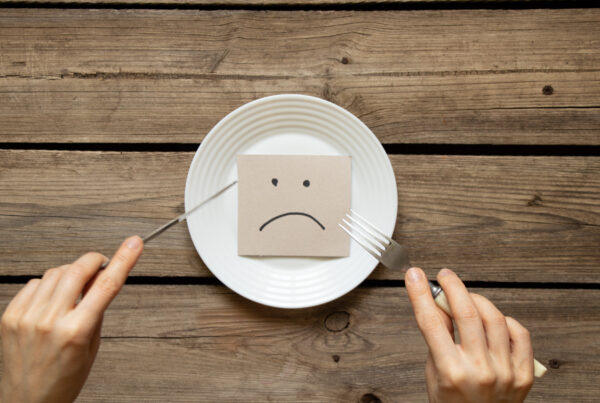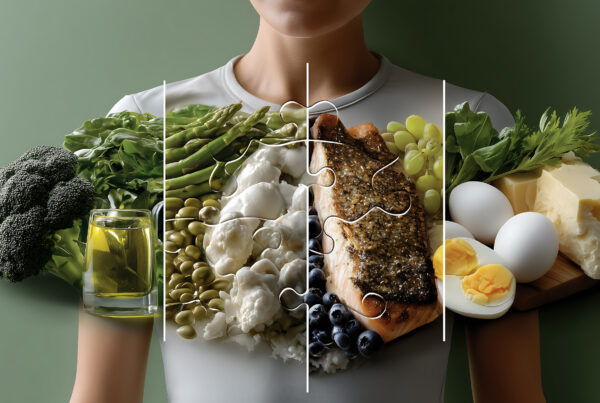”Question: Is diet related to mental health?
Reading time: 3 Minutes
MWi Hack:
- The link between diet and mental health is significant, as research shows that what we eat can directly impact how we feel emotionally and psychologically.
MWi Summary:
- Diet directly influences brain function, with nutrients affecting neurotransmitter production and regulation of mood.
- Deficiencies in key nutrients like omega-3 fatty acids, B vitamins, zinc, iron, and vitamin D are associated with higher rates of depression and anxiety.
- Eating patterns that promote inflammation, like diets high in processed foods, sugar, and unhealthy fats, are linked to increased risk of mood disorders.
- Gut health and the gut-brain axis play a major role, as the microbiome impacts production of neurotransmitters that regulate mental health.
- Following an anti-inflammatory, nutrient-dense diet rich in fruits, vegetables, whole grains, lean protein, and healthy fats can support positive mental health.
How are diet and mental health linked?
The relationship between our diet and our mental health is complex. However, research shows a link between what we eat and how we feel.
Eating well can help you feel better. You don’t have to make big changes to your diet, but see if you can try some of these tips.
- Eat regularly. This can stop your blood sugar level from dropping, which can make you feel tired and bad-tempered.
- Stay hydrated. Even mild dehydration can affect your mood, energy level and ability to concentrate.
- Eat the right balance of fats. Your brain needs healthy fats to keep working well. They’re found in things such as olive oil, rapeseed oil, nuts, seeds, oily fish, avocados, milk and eggs. Avoid trans fats – often found in processed or packaged foods – as they can be bad for your mood and your heart health.
- Include more whole grains, fruits and vegetables in your diet. They contain the vitamins and minerals your brain and body need to stay well.
- Include some protein with every meal. It contains an amino acid that your brain uses to help regulate your mood.
- Look after your gut health. Your gut can reflect how you’re feeling: it can speed up or slow down if you’re stressed. Healthy food for your gut includes fruit, vegetables, beans and probiotics.
- Be aware of how caffeine can affect your mood. It can cause sleep problems, especially if you drink it close to bedtime, and some people find it makes them irritable and anxious too. Caffeine is found in coffee, tea, cola, energy drinks and chocolate.
What should I eat?
The VA offers free resources on diet and mental health.
Eat healthy snacks, such as:
- A piece of fruit with a few crackers and one piece of cheese
- Yogurt or cottage cheese with a piece of fruit
- A breakfast bar with a glass of milk
- 1 or 2 carrots or stalks of celery with peanut butter or cream cheese
If you have a tendency to gain weight, try to:
- Space out the times you eat and drink throughout the day
- Eat and drink slowly and don’t do anything else, such as watch TV, while you are eating
- Put your food on a smaller plate
- Drink one 8 ounce glass of water a half an hour before each meal
- Eat foods that are low in calories, such as fruits and vegetables
- Take daily vitamins if you have not been eating a balanced diet.
- Add extra fiber to your diet and drink juices, particularly prune juice, if you get constipated easily or are taking a medicine that causes constipation.
- Some medicines may require you to change your diet. Talk with your healthcare provider or pharmacist about whether you may need to make changes.
Mind also has advice around food and mental health – with tips on eating well, and how to manage your mood with food, including foods to avoid if you’re taking certain medications.
Sharing meals with other people
Eating meals with other people has many psychological, social and biological benefits. They give us a sense of rhythm and regularity in our lives, a chance to reflect on the day and feel connected to others. Biologically, eating in upright chairs helps with our digestion. Talking and listening also slow us down, so we don’t eat too fast.
Make the most of mealtimes by setting aside at least one day a week to eat with family and friends. Choose a meal that’s easy to prepare, so it doesn’t become a chore. Share responsibility, so everyone has a different task: doing the shopping, setting the table, cooking or washing up, for example. Keep the television off so you can all talk and share.
Eating disorders
If you feel you’re using food as a negative coping mechanism to deal with emotional pain or as a way to feel in control, you may have an eating disorder – find out more, including where to go for help here.
Other ways I can take care of my mental health
A healthy diet is one way you can improve your mental health. Other things include staying physically active, spending time in nature, avoiding cigarettes and alcohol and developing good sleep habits.
MWi would like to thank The Mental Health Foundation for sharing these insights with our community. Click the button below to go to the original article:






